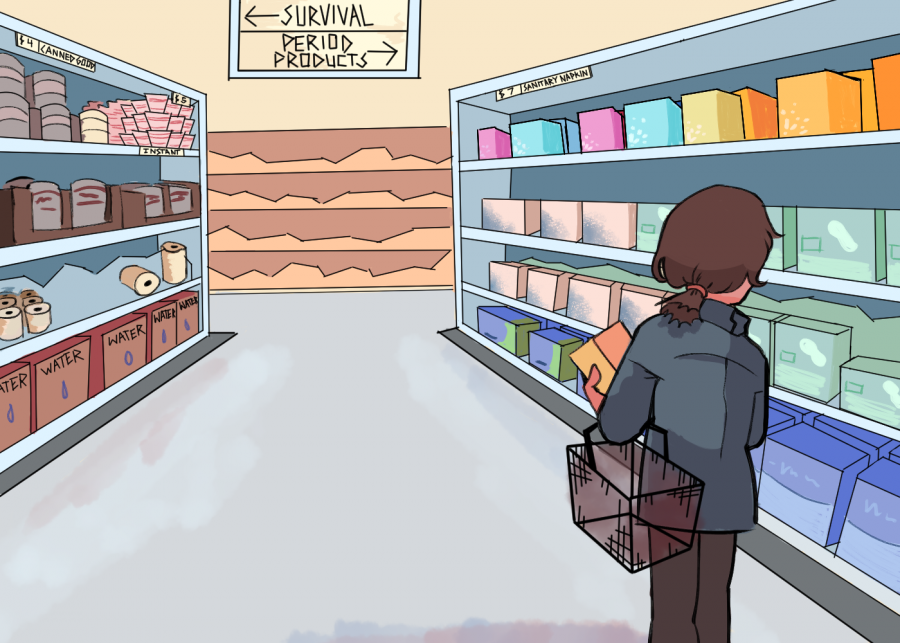Ending Period Poverty: Scotland Creates Period Products Bill
Art/Photo by Lauryn Shin
People in poverty must choose between survival products and period products. Oftentimes this means some people can’t buy period products at all even though they are just as essential as food or water. Women of West Vice President Olivia Crump (12) expressed, “Period poverty/menstrual equity is something I am very passionate about so seeing a country like Scotland take progressive steps for change is really empowering.”
December 15, 2020
Relief washes over millions in Scotland as it becomes the first country to provide all period products at no cost starting on Tuesday, November 24th.
The Period Products (Free Provision) (Scotland) Bill, which lawmakers unanimously voted in its favor, requires all local authorities to ensure the availability of menstrual products in locations such as schools, universities, and other designated public spaces. The legislation offers a reasonable choice of different products, as well as allowing products to be delivered instead of collected.
Since 2016, Scottish Parliament Member Monica Lennon has been campaigning to aid those with low incomes who are unable to afford or access period products —a phenomenon known as “period poverty.” According to a recent survey conducted by Young Scot, Scotland’s national information and citizenship organization, 1 out of 4 students struggled to acquire period products. Fortunately, Scotland passed a law in 2018, requiring schools, colleges, and universities to provide menstrual products. In the following year, this law was expanded to include libraries and recreational centers.
But with the sudden shutdown of schools, devastating job losses, and the closing of many stores in response to the pandemic, even more individuals are being plunged into period poverty. Women of West member Manaal Sultan (12) expressed, “I’m lucky enough to have financial stability, but I know period products aren’t cheap and it’s hard enough for a lot of people to make ends meet right now.” Menstrual hygiene products aren’t covered by national food stamps, and over 30 states still apply sales tax. Many people have been forced to choose between either eating lunch or buying a box of pads.
Olivia Crump (12), Women of West Vice President, also explained how the pandemic especially affects the homeless population: “For a lot of homeless women, they rely on public bathrooms for menstrual product alternatives such as making their own tampons or pads or using sinks/bathrooms to clean themselves.” Unfortunately, the lockdown caused many park bathrooms to close, limiting the public facilities homeless individuals can use. The pandemic has left many without the necessary supplies to manage their periods.
Many health issues can arise from improper menstrual hygiene. Prolonged tampon use can cause complications such as Toxic Shock Syndrome, a life-threatening condition that can severely damage the body. Using unhygienic substitutes such as socks or newspapers can also cause major bacterial infections. The newly approved Period Products Bill can greatly improve the well-being of many and reduce stress around managing one’s period.
Lennon and other lawmakers have added that there is still much work to be done to tackle the stigma surrounding periods. Crump presented one source of the shame: “A big part of it is that periods are seen mostly [as] a women’s issue. Because it doesn’t occur to half the population, periods and women’s health have been largely ignored.” Many people may also have a negative association with periods and may think they are “gross” or “unsanitary”. Participants in the Scottish survey admitted they felt ashamed and isolated by their period or their inability to afford them. As a result, many have missed school, work, and social events.
Nevertheless, this bill serves as a huge step for Sweden. At the moment, there are only a handful of U.S. states including California, Illinois, New York, and Virginia that have passed laws mandating free period products in schools. Sultan and Crump hope Sweden’s change will motivate other countries to follow suit and start treating period products as essentials because as stated by Crump, “Women are important and so are their periods.”






